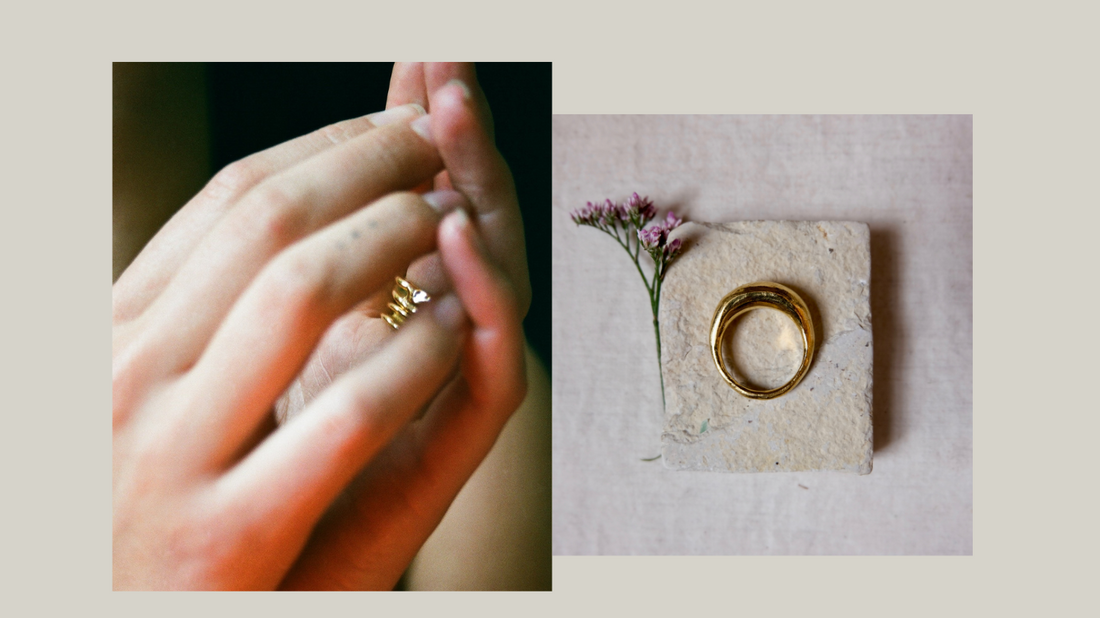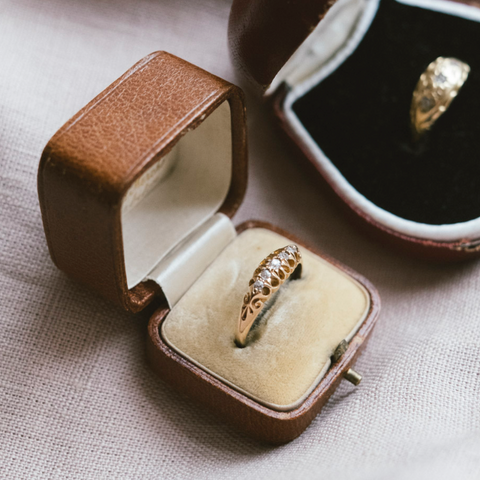
Ethical Wedding Bands: A Buyer’s Guide
Share
Purchasing ethical wedding bands can be a minefield, especially with the abundance of options available and the prevalence of greenwashing in the market. Luckily, I’ll be providing you with all the necessary information you need to purchase an ethical wedding ring or wedding band with confidence. Sit back and relax as we delve into the world of what to consider and what to be aware off, drawing on over 10 years of industry experience, we have got you covered.
In this guide, we'll delve into what ethical wedding bands are, explore different materials you should consider, highlight key organisations promoting ethical practices, and I’ll include some tips to ensure you're buying from the most responsible brands.
What is an Ethical Wedding Band?
Before we talk about finding an ethical wedding band that is perfect for you, let's discuss what makes a wedding band ethical. In a world where this term gets thrown around a lot, it's important to know what products actually fit the description.
To put things simply, think of an ethical wedding band as one that not only looks stunning but also has a positive impact, now and for the future, on the planet and the people involved in creating it. In more specific terms ethically sourced wedding bands follow these criteria:
Responsibly Sourced: Ethical wedding bands start with responsibly sourced materials. This means metals, and other materials, are recycled, up-cycled or mined in a way that minimises environmental harm and respects workers and their rights.
Has Transparent Business Practices: Ethical bands are all about transparency! They're not afraid to pull the curtain back and really show you where your ring comes from and how it's made.You should be able to ask the maker about its entire journey- from metal source, who’s hands its passed and what production methods were used.
Has a Positive Social Impact: Ethical wedding bands should have a positive social impact. Whether it's supporting fair wages for workers, giving back to communities or supporting small independent brands, these rings do more than just sparkle, they make a difference in people’s lives every day.
Which Wedding Band Materials Should You Consider Buying?
Now that we've gone over what makes a wedding band ethical, let's talk about specific materials. Choosing the right material for your wedding band is important. This isn’t just about the aesthetic appeal but how your wedding bands influence the environment.
Here's a deeper look at some materials I think are worth looking into:
Precious Metals (Recycled, Fairtrade, and Fairmined)
Opting for recycled precious metals like gold or silver is a great way to reduce your environmental impact. These metals are repurposed from existing sources, minimising the need for new mining and reducing the demand for raw materials, which is great for our planet! We suggets recycled as a great option if environmental issues is what is close to your heart.
If you relate to social impacts more then a gold band or ring in fairtrade gold is a great option- Ensuring that miners receive fair wages and work under safe conditions. By choosing Fairtrade certified products, you're supporting responsible mining practices and empowering small-scale miners in developing countries. Although there is still an environmental impact, it is a positive movement as it supports communities to survive and not be exploited.
Finally, similar to Fairtrade, Fairmined gold guarantees fair wages, safe working conditions, and environmentally responsible mining practices. It's a certification that puts social and environmental sustainability first in the gold mining industry.
Vintage and Up-cycled
For those who like the classics, vintage and antique wedding bands are another timeless choice for ethical unisex bands. Each of these pre-used products has its own unique history, sentiment and character. By opting for a vintage ring, you're not only embracing classic style but also reducing the demand for new materials while minimising waste, keeping a more circular economy. If you find a vintage ring you like, you can often have it checked over by a professional jeweller and have it re-sized to fit you.
On the other hand, up-cycled wedding bands are repurposed materials, using jewellery or metal you may already have. From repurposed ethical silver and gold bands, old engagement rings, silver bangles or chains. The metals can be up-cycled and remodelled into something new for you. Keepign sentiment off your metal yet transforming it into something new. These style of wedding rings offer a sustainable and creative alternative.
Alternative Materials like Wood
For something a little different, wooden wedding bands are a rustic and eco-friendly choice for any nature-loving couple! Look for wood crafted from sustainably sources, these bands add a touch of natural beauty to your hand. Plus, they're usually hypoallergenic and lightweight, making them very comfortable to wear.
Natural River Gold
Some artisans specialise in using gold sourced from rivers. I think this material provides an amazing alternative to traditional mining practices, as natural river gold is mainly collected through sustainable methods like panning. This significantly reduces the ecological footprint associated with gold extraction, its a beautifully poetic also, if this is your thing then you may also like to incorporate Ocean Diamonds- which are diamonds sourced form the sea bed.
Organisations You Should Be On The Lookout For?
If you’re curious about the organisations that play a huge role in promoting transparency, accountability, and sustainability in the jewellery industry, I’ll introduce them below. By supporting these initiatives and choosing products certified by these organisations, you can have a positive impact and contribute to a more ethical and responsible jewellery market. Bare in mind smaller brands, may be operating as ethically as these organisations but may ot have the funds to be part of them, so dont let that put you off using brands that are not part of the organisations- the best thing to do it ask questions when you find a designer you like.
1. Responsible Jewellery Council (RJC)
The RJC is a nonprofit organisation that has fully dedicated itself to promoting responsible practices throughout the jewellery supply chain. They set some of the highest standards for ethical, social, and environmental practices in the industry, by evaluating human rights, labor rights, environmental impact, and product disclosure.
2. Fairmined
Fairmined is a certification standard for responsible artisanal and smaller gold mining operations. It makes sure miners receive fair wages and are working under safe conditions. This initiative also makes sure companies are following sustainable practices.
Fairmined-certified gold is traceable every step of the way, which provides transparency and accountability within the supply chain. In short, supporting Fairmined initiatives helps improve the livelihoods of small-scale miners and promotes responsible mining practices.
3. Fairtrade
Fairtrade works to empower farmers and workers in developing countries through fair trade practices. In the jewellery industry, Fairtrade certification ensures that gold and other precious metals are sourced ethically all over the world, with fair prices paid to miners and money invested in community development projects. Choosing Fairtrade-certified jewellery supports humane and sustainable livelihoods for mining communities and contributes to social and economic justice.
4. No Dirty Gold
Finally, No Dirty Gold is a campaign launched by Earthworks, an environmental advocacy organisation. They raise awareness about the environmental and social impacts of gold mining.
The campaign advocates for responsible mining practices, including the elimination of mercury pollution, protection of water resources, and respect for human rights!
By supporting the No Dirty Gold campaign and buying from brands supported by this specific campaign, you can pressure jewelry companies to adopt more sustainable sourcing practices and reduce their environmental footprint!
How to Dig Deeper Into the Brands You Purchase Wedding Bands From?
When buying ethical unisex wedding bands, it's crucial to think about which brands you are purchasing from. You want to do your research and dig deeper into the brand and how it operates its business. This way you can responsibly purchase your wedding rings and bands. I suggest going over these key factors when making your decision on who to buy from:
Consider Plating and Chemicals
Try to steer clear of brands that make plated wedding bands. Not only is this practice bad for the environment, but it may introduce harmful chemicals into the environment and on your skin. Plating also hurts the longevity and quality of your ring and wedding bands.
Embrace Handmade and Local Products
Choose handmade bands to support skilled artisans, local economies, and traditional craftsmanship. Handmade wedding bands and rings carry a unique charm and personal touch that mass-produced alternatives simply can't replicate. Especially if they are coming from your local artists and small businesses.
Consider Ethically Sourced Stones
Again, you want to opt for brands that use ethically sourced gemstones and metals to ensure fair labor practices and environmental responsibility. Ethical sourcing guarantees that the beauty of your ring doesn't come at the expense of other people or our planet. This could include choosing brands that use lab-grown diamonds, ocean diamonds, fairtrade gemstones, antique stones. You cna read more about this on my website.
Look Into Packaging and Shipping
Also, be on the lookout for brands with eco-friendly packaging and shipping practices to minimise waste and your carbon footprint. Sustainable packaging reduces environmental impact and reflects a brand's commitment to responsible business practices. Even better look for brands that use regenerative packaging that gives back- such as materials like mycelium.
Transparency and Accountability
Brands that are transparent about their sourcing and production processes should be at the top of your list. The company you go with should provide assurances through certifications or third-party audits. This transparency builds trust and lets you make informed choices about the products you're buying which creates better accountability within the industry.
Trust your gut- if you cna then try organising a meeting with the maker or a zoom call, ask the right questions and see how you feel, trust your instinct.
Figuring Out Which Brand Resonates The Most With You
Selecting the perfect ethical wedding band is a personal journey. You want to find a brand that not only aligns with your values but also takes the time to consider what you want. In particular, I highly recommend looking for brands that offer a personal touch in terms of customer service. See if the brand you like offers consultations or visits to their location.
Look at the brand's website and see if they share your values of sustainability and social responsibility. Do they actually prioritise transparency and accountability when making their products?
Final Thoughts and Suggestions on Buying Ethically Sourced Unisex Wedding Bands
By prioritising ethical sourcing and responsible manufacturing practices, you can find the perfect wedding bands that not only symbolise your love but also align with who you are as a person. Remember, the path your ring has taken matters just as much as the love it represents.
When you choose wisely, you’ll cherish your ethical wedding band for a lifetime, whether you're looking for men’s men's ethical silver wedding bands, unisex bands, and rings, or other personalised options for your wedding and engagement rings! My own brand follows sustainable practices and is eco-friendly You can check out my ethical collection and see what materials we use here at this link.
Thankyou for reading, I hope this has helped you feel more informed and confident in purchasing the right rings for you! x






